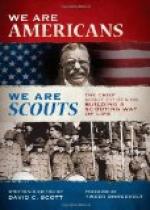The wagon master said that he would not feel very easy until we had passed and were out of sight of the Indians and their village, and I believe he spoke the truth, for he was up and had everything ready. We were on the road by sunrise. When we were nearly opposite the Indian village, the squaws discovered us and came running towards us in droves. I rode out and met them and had a general hand-shaking with them, and they wanted me to assure them that I was coming in four months to trade with them and wanted me to go and look at some of the robes they had dressed, which I did, and in doing so, I saw something that I had never seen before nor have I since. It was a white Buffalo skin, and the animal must have been a half-grown cow judging from the size of the skin. It was the prettiest thing of the kind that I had ever seen, or ever have since. When I was looking at the beautiful thing, I asked the Indian that I thought it belonged to how much he would take for it. He said it was not his, that it was his squaw’s. I asked her what her price would be, and she answered, “One string of beads.” I told her to save it for me and in four months I would come back and bring the beads to her and take the robe. I was so interested in looking at the robes and talking with the Indians that time passed without notice, and the first thing I thought about it, in looking at my watch I found it was nearly noon. I now bid the Indians good bye, mounted my horse and started to overtake the train. When I caught up with them, I found that the Capt. was feeling very uneasy about me, and the wagon master thought the Indians had taken me captive.
When I rode to the Capt’s. side, he said, “This settles it. I have been fighting the Indians for several years, and I must admit now that I don’t know anything about them, and I will confess that I was like “the Missouri”; I had to be shown before I believed. But having seen like them, I am satisfied that you knew what you were talking about. After the experience of this morning, I cannot doubt that through your friendship with the Red skins we shall get through to Santa Fe in safety without having any trouble with them.”
That evening when we went into camp, the Capt. and the wagon master came to me. The Capt. said, “Mr. Drannan, you are so well acquainted with the Comanche Indians, perhaps you can tell us where we shall pass their main village and where the Indians are likely to be the most numerous.” I answered, “This is an unusually late fall, and the Buffalo are as a consequence unusually late in going south and are more scattered than they would be earlier in the season, and I do not think we will pass the Comanches’ main village under forty miles from here. You must understand that the Comanches’ main village is always near where the largest herd of Buffalo cross the river, and from this on we will travel as we have been doing; I will take the lead five or six miles in advance of the train so that if we come on to a band of Indians or a small village I can meet them and have a talk with them before the train gets up to them, and Capt., I want you and the other men to keep a close look out, and if any of you see any Indians coming towards the train from any direction, send a runner after me at once, for I want to meet the Indians before they get to the train.”




